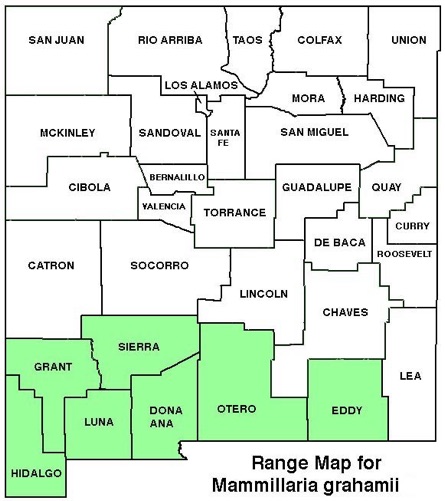WILDFLOWERS OF NEW MEXICO

Generally this small, spherical (young) to cylindrical (older) cactus grows in clusters of stems to 6-inches tall and 2 1/2-inches wide, and densely covered with spines. Note each areole usually has a single long central spine with a hooked tip, and the stamens have pinkish filaments..
FLOWER: April. A circle of showy, rose-pink flowers, 3/4–1 1/8-inches diameter (2–3 cm), bloom below the stem apex. Flowers have showy narrow, linear, pointed petals (tepals), the outer ones with fringed edges; numerous reddish-pink filaments with yellow anthers, and a stigma with greenish lobes. Fruit green maturing red, club-shaped, 1/2–1 1/8 inches long (12–29 mm).
SPINES: The areole on each nipple-like tubercle has 17–35 bristly, white radial spines 1/4–1/2-inch long (6–12 mm), and 1–4 central spines 1/2–5/8-inch long (12–15 mm), reddish-purple to blackish, one with a hooked tip.
HABITAT: Sandy, gravelly, rocky soils; desert grasslands, creosote bush scrub, pinyon-juniper woodlands.
ELEVATION: 4,500–5,100 feet.
RANGE: AZ, CA, NM, TX.
SIMILAR SPECIES: Another fishhook cactus, Wright’s Fishhook Cactus, M. wrightii, widespread in central and western NM, has flowers with long fringe on the outer tepals, 2–3 hooked central spines, and only 8–15 radial spines per areole.
NM COUNTIES: Southern NM in low-elevation, arid habitats: Dona Ana, Eddy, Grant, Hidalgo, Luna, Otero, Sierra.

GRAHAM’S FISHHOOK (NIPPLE) CACTUS
MAMMILLARIA GRAHAMII
Cactus Family, Cactaceae
Perennial cactus

THE CONTENTS OF THIS WEBSITE ARE COPYRIGHTED AND CANNOT BE USED
WITHOUT PERMISSION OF GEORGE OXFORD MILLER




Stems have bristle-like radial spines and long, hooked central spines.
Older stems are cylindric and clustered (above); young stems are spheric and single (below).



EMAIL ME
Outer petal-like tepals are entire or only minutely fringed.

Flowers bloom in a ring around the stem below the apex.